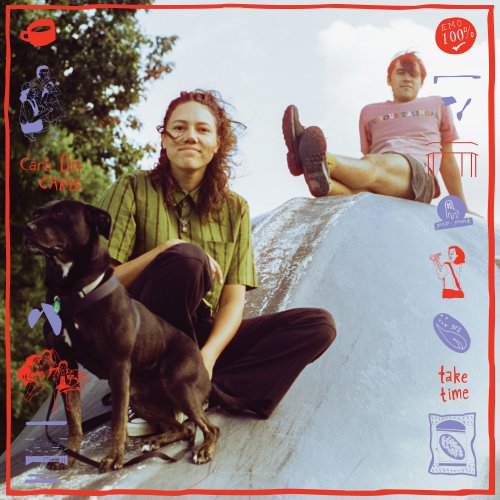Carb On Carb - Album Review: Take Time
 Carb on Carb was a busy, touring band until the lockdowns of
2020 and 2021. While promoting their first two full length albums, For Ages and
their self-titled debut, James Stuteley (drums / vocals) and Nicole Gaffney (guitar
/ vocals) toured as far as Japan and the US, as well as extensively throughout
New Zealand. All that changed after the pandemic and the events that followed.
Nicole took time to mentor future female musicians with the Girls Rock! programme,
and James wrote and recorded music in Te Reo with How Get. They also took the
time to write and develop what would turn into their third album, the
appropriately named, Take Time.
Carb on Carb was a busy, touring band until the lockdowns of
2020 and 2021. While promoting their first two full length albums, For Ages and
their self-titled debut, James Stuteley (drums / vocals) and Nicole Gaffney (guitar
/ vocals) toured as far as Japan and the US, as well as extensively throughout
New Zealand. All that changed after the pandemic and the events that followed.
Nicole took time to mentor future female musicians with the Girls Rock! programme,
and James wrote and recorded music in Te Reo with How Get. They also took the
time to write and develop what would turn into their third album, the
appropriately named, Take Time.
It’s an album that inspects the past and dwells on the present, but also discusses the future, but not in a manner you might expect. Given the genre most closely aligned with the band is emo-revival, it’s fitting that album opener and first single 2009 explores trends that are specifically dated. There is a pretty much constant rumination on time throughout this collection of songs; whether it’s about aging, frustration during lockdown, or reminiscing on the distant past, Take Time really comes close to being a post-modern concept album.
The album was recorded in Palmerston North’s The Stomach and mixed by Chris Teti of The World is a Beautiful Place and I Am No Longer Afraid to Die, (that’s a world-famous American emo band for those who don’t know). I believe this choice of mixer might well be because the musicians respect his craft and skills, but also perhaps to lean more heavily into the emo label. Certainly, it is an interesting genre that has come full circle since it was berated in the late 2000’s as bad taste, (but this may have been in reaction to the more extreme forms of the style and the fashion that came with it); thus the revival I see in many New Zealand bands today who are proudly taking the term back. Carb on Carb could easily have been described as belonging to the all-inclusive pop-punk label, with a penchant for sweetly sung harmonies reminiscent of folk music. Why they want to be aligned with this label perhaps lies in the album opener, the already mentioned, 2009. This song ties the band to the style, dates the band members proudly, and sets the mood for the album to come, at least lyrically. The song is fast paced, beginning with a sudden exuberance that really does remind you of the impulsiveness of youth. The fast, punky verse discusses reminiscing in kitchens about jumping fences in skinny jeans, while the chorus breaks this momentum and changes the mood from frantic to nostalgic while Nicole purrs "Walking home in groups at night, Arms raised to the street lights" which paints a vivid picture. As with most emo-revival music, there appears to be a convention that is as recognizable as grunge songs playing with dynamics between verse and choruses. In the case of emo, it seems the verse stays up-beat (and usually fast and in a major key) while the chorus (or pre-chorus in a few examples) changes to half-speed and uses the relative minor. It’s a useful trick, one that is used more than a few times on Take Time to great effect.
Back Where You’re From features a sleek, tricky guitar fill for most of the song, playing against a complicated rhythm that James competently performs throughout. Again, the song centres on the topics of home, leaving home and the unknown, themes that truly are emotional and that the band members must have felt most keenly during their writing period during the lockdown. It’s a sweet song, but over so quickly, it really makes me wish there was more – but perhaps the point they’re trying to make regarding the fleeting nature of life.
Home Again 7 also draws lyrically from the same well of sensations and memories, and like many other emo songs, it operates at an interesting spot between ballad and anthem. I’ve never heard the lines “I’ve always wanted to drive a truck, I’ve always wanted my own small bus,” sung with such vigour and expressive energy.
Grounded really is a beautiful ballad tackling the very real concern everyone felt during the lockdowns, probably felt most keenly by musicians who had travelled so much just beforehand. Nicole sings in one of her most vulnerable moments on the album: “…been waiting in this room for two years, I’m hyper aware, clean the wax out of my ears, constant fear.” Alone with her own thoughts, the musician here notices the passing of time in the very real present tense.
The album songs may be short but there’s no fat on them. The songs are chocka-block full of ingenuous riffs and sophisticated drum parts, played clearly to not overpower the vibrant and sugary melodies sung above. Although the lyrics are a little hard to hear at times, that may be due to the other instruments not being that low in the mix and Nicole’s unabashed Kiwi accent. There are a few songs that are a little more rocky; Motuihe starts with some real dissonance and contains some scrappy-growly overdrive. Overcommunicate uses a nice fuzzy sound when it jumps into action that only slightly boosts and colours the guitar signal from before, but in this case it’s the drums that propel the song into rock song territory with a steady double beat. Let Go is real single material with an infectious riff and another syncopated rhythm which allows the line “broken promises let go, at the state of growing old” to sound almost mantra-like.
But ultimately, it’s an album about life, time, age and how to come to terms with it especially within a youth orientated and obsessed industry and culture in general. OK Bye features a complicated rhythm that allows a pleasant tension to grow. The song grapples the issues with growing older head-on. “You’re unsure, I foresee what time will do to you and me,” but then the song ends happily as if accepting fate. Album closer I Know The End 2 is a duet that makes the line “our muscles are seizing up, pretty soon we won’t be able to move much” seem like poetry rather than a verse to a rock song. Thirtysomethings literally mentions graves, spider veins, and an awkward stage! These topics take bravery to first discuss, and even more to use them as your main source of inspiration for an album.
After repeated listens, I feel as if the energy seems to be decreasing (on average at least) from the frantic first song into the beautiful duet that ends with the words “…and hope it helps.” This might not be intentional, but it makes for a cathartic and strangely calming experience. I can’t really think of many albums that tackle the topic of time and aging with such fun, irreverence and heartfelt emotion. Take Time is a collection of powerful songs, performed beautifully and written with absolute honesty. It’s what albums should be – an expression of the artist without filter.
About Carb On Carb

Relentless touring won over fans across Australasia and the band temporarily relocated to Australia in 2017. This time away drew the band’s focus back to home with their celebrated second album For Ages (2018); an extended love letter to NZ, with “soaring vocals, a guitar tone warm as a woollen blanket, mathy lead bits, ever changing dynamics and crash cymbals that wash over you like the ocean...as good an emo release as you will hear anywhere this year” (4ZZZ).
After few years back in Aotearoa and the inevitable covid-delay factor, their third and final album Take Time was released in early 2024; "a cathartic and strangely calming experience. I can’t really think of many albums that tackle the topic of time and aging with such fun, irreverence and heartfelt emotion. Take Time is a collection of powerful songs, performed beautifully and written with absolute honesty. It’s what albums should be – an expression of the artist without filter” (Muzic.net.nz).
Visit the muzic.net.nz Profile for Carb On Carb
Releases
Other Reviews By Nicholas Clark
 Search For Yeti - Album Review: Dark So Soon
Search For Yeti - Album Review: Dark So Soon
28 Nov 2024 // by Nicholas Clark
Search for Yeti’s first full length album Dark So Soon offers a rich banquet of genres and melodies. The record oscillates between predicting a future filled with either dread or hope, while the band either softly establishes a tender ambience or plays catchy power pop.
Read More...
 DarkWater - Album Review: Turning Point
DarkWater - Album Review: Turning Point
13 Nov 2024 // by Nicholas Clark
Turning Point is a complex, dynamic album that takes the listener on an intense ride. There are mysterious, fragile, powerful and gritty moments to discover on this ten-track offering that sounds both balanced and refined.
Read More...
 Job Site - EP Review: The New Zealand Experience
Job Site - EP Review: The New Zealand Experience
15 Oct 2024 // by Nicholas Clark
Emerging from the Waikato, high energy punk band Job Site showcases their special blend of comedic music on their latest offering, the 4 track The New Zealand Experience EP. The band plays fast and heavy throughout the recording, with rhythms that range from oi-punk, thrash music and even a little 2000’s indie rock.
Read More...
03 Sep 2024 // by Nicholas Clark
Six iconic venues. Twenty eight acts.
Read More...
 Voodoo Bloo - Album Review: Dead-end Rodeo
Voodoo Bloo - Album Review: Dead-end Rodeo
28 Aug 2024 // by Nicholas Clark
Rodeos, at least in this country, aren’t perceived as sport nowadays. If the term is used at all in New Zealand it usually refers to a metaphor for an intense struggle to survive or to conquer the unconquerable, if but for fleeting moment.
Read More...
 Gig Review: Bad Schematics @ Moon, Wellington - 26/07/2024
Gig Review: Bad Schematics @ Moon, Wellington - 26/07/2024
27 Jul 2024 // by Nicholas Clark
Fresh from picking up numerous awards in the recent National Battle of the Bands competition, Bad Schematics have embarked on a North Island tour including Tauranga, Auckland and their hometown Palmerston North, to promote their newest album,C O L L I D E. Tonight, along with winners of the competition for this year, Adoneye, finalists Donal and The Bucks and last year’s second place winners, Dave and the Dirty Humans, Bad Schematics hit Wellington’s favourite underground alternative music venue and pizzeria, Moon.
Read More...
 Gig Review: Floyd Marsden @ Valhalla, Wellington - 18/07/2024
Gig Review: Floyd Marsden @ Valhalla, Wellington - 18/07/2024
19 Jul 2024 // by Nicholas Clark
Although technically a sad affair, (as it was to be final of Floyd Marsden’s string of local shows promoting her album The Disco Lizards), the atmosphere in Valhalla was uncharacteristically filled with retro vibes but the usual friendly faces. In support for this show was Adult Friends, spearheaded by vocalist/guitarist Jackson Kidd who was also the producer of The Disco Lizards.
Read More...
 SuperMild - EP Review: SuperMild
SuperMild - EP Review: SuperMild
11 Jun 2024 // by Nicholas Clark
SuperMild is a busy band playing lots of venues and entertaining crowds with their blend of reggae tinged psychedelic rock. Their debut, self-titled four song EP is out now, and it spans the many sounds the band can summon with just three members.
Read More...
Most Viewed Artists
Latest Galleries
NZ Top 10 Singles
- APT.
ROSÉ And Bruno Mars - DIE WITH A SMILE
Lady Gaga And Bruno Mars - BIRDS OF A FEATHER
Billie Eilish - TASTE
Sabrina Carpenter - I LOVE YOU, I'M SORRY
Gracie Abrams - ESPRESSO
Sabrina Carpenter - SAILOR SONG
Gigi Perez - LOSE CONTROL
Teddy Swims - A BAR SONG (TIPSY)
Shaboozey - GOOD LUCK, BABE!
Chappell Roan













 Report A Problem
Report A Problem

